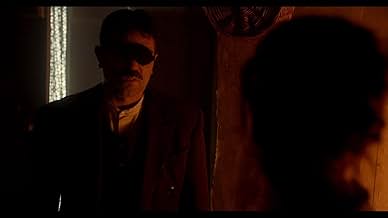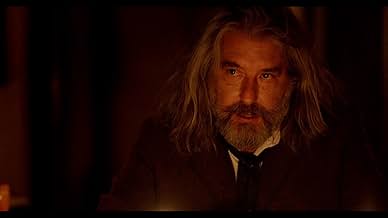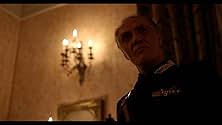IMDb-BEWERTUNG
4,4/10
1680
IHRE BEWERTUNG
Es folgt dem römisch-katholischen Heiligen Pater Pio in seinen frühen Jahren.Es folgt dem römisch-katholischen Heiligen Pater Pio in seinen frühen Jahren.Es folgt dem römisch-katholischen Heiligen Pater Pio in seinen frühen Jahren.
- Regie
- Drehbuch
- Hauptbesetzung
- Auszeichnungen
- 1 Gewinn & 1 Nominierung insgesamt
Empfohlene Bewertungen
So this has to be by far the most disappointing film I've seen in 2023. Why? I was so looking forward to this film for over a year before its release, expecting some semblance of a Padre Pio biopic. What I got instead? A completely different film whose plot involved the struggle of communists vs fascists in a small provincial Italian town, with Padre Pio being an incidental character who wasn't relevant to the plot AT ALL. In fact, had it not been for the last few seconds of the film's ending where they show him getting the stigmata, Padre Pio could have literally been interchanged with any generic provincial Italian friar. I'd even go a step further: if all his scenes were deleted from the film, it would not have changed the plot in the slightest whit. I would have at least been a bit more forgiving if they had taken 'artistic liberties' with telling Padre Pio's life, as some over-enthusiastic biopics tend to do.... but they didn't even do that! They do not discuss, flesh out, or even relay the tiniest iota of the story of Padre Pio... he is merely an incidental and inconsequential character in a story involving the early struggles of Italian partisans against the nascent fascists. I'm not saying that there is anything inherently wrong with that type of story (though truth be told, even that was bland and uninteresting), but if that was the main point and intent of the film, then the filmmakers should have been up front about it, and shouldn't have duped the audience by disguising this as having anything remotely to do with Padre Pio. Shame, as Padre Pio's story is fascinating on its own, and actually TELLING his story would have been immensely more interesting than this insipid drivel we were given here.
The town parts, which is most of the movie, were just awful. Broken English, heavy accented English from everyone. Why not have them speaking Italian? It would have made it a lot better
But maybe only one star better. The town dialogue was boring and uninteresting and far from the way a regular person would speak. I did not care about any of the townspeople, they all could have died and I would have been happy to get back to the scenes of Pio which is the movie's topic.
I gave a star for Shia's performance as Padre Pio. Again the writing isn't there for it to be one of his best performances or anything, but it was the only enjoyable part of the movie.
I have a crazy idea why not put more Padre Pio scenes in a film about Padre Pio? Maybe they didn't think of that. Whole film could have been in the church instead and it would have been a solid 5/10.
But maybe only one star better. The town dialogue was boring and uninteresting and far from the way a regular person would speak. I did not care about any of the townspeople, they all could have died and I would have been happy to get back to the scenes of Pio which is the movie's topic.
I gave a star for Shia's performance as Padre Pio. Again the writing isn't there for it to be one of his best performances or anything, but it was the only enjoyable part of the movie.
I have a crazy idea why not put more Padre Pio scenes in a film about Padre Pio? Maybe they didn't think of that. Whole film could have been in the church instead and it would have been a solid 5/10.
Such a disappointment. Literally 20 minutes of the film contains Padre Pio. This movie focuses on political issues in Italy rather than Padre Pio. The film was boring & lacked any points of interest. Crew had no idea the talent in Shia LeBouf, who did a phenomenal job as Padre Pio. He wasn't given anywhere near enough screen time or enough opportunity to portray Padre Pio. Nudity in a film about the greatest saint of our time is so sacreligious & disrespectful to the man that is Padre Pio as well as his religion. This is an injustice to Padre Pio & such a bust. LeBouf was phenomenal, storyline was awful.
Despite the historical events and perhaps leading characters personal dark and heavy route towards becoming who he was that does not mean they film needs to also be so dark.
It seems that lately films are more and more separated into fluff and pop corn blockbusters and then you have these heavy "artistic" or religious or quasi intellectual films where they examine certain characters or events. So that after the viewers and producers can pat each other on the back how smart and deep their introspection is.
While not too long ago, directors knew how to interweave complex, dark or troublesome events with light, with entertainment , with charismatic characters to offput that or moments to balance it out. Intellectual and dark doesnt mean it needs to be heavy and difficult to watch.
Very very few know how to do this nowadays, Lebeoufs films never do. They are just plain dark and uncomfortable to watch. Especially ones like this, where they (unfortunately only) focus on the most heavy part of his journey to becoming Padre Pio everyone knows.
It seems that lately films are more and more separated into fluff and pop corn blockbusters and then you have these heavy "artistic" or religious or quasi intellectual films where they examine certain characters or events. So that after the viewers and producers can pat each other on the back how smart and deep their introspection is.
While not too long ago, directors knew how to interweave complex, dark or troublesome events with light, with entertainment , with charismatic characters to offput that or moments to balance it out. Intellectual and dark doesnt mean it needs to be heavy and difficult to watch.
Very very few know how to do this nowadays, Lebeoufs films never do. They are just plain dark and uncomfortable to watch. Especially ones like this, where they (unfortunately only) focus on the most heavy part of his journey to becoming Padre Pio everyone knows.
The First World War has just ended, but peace is far from the Italian village of San Giovanni Rotondo. As families welcome back their loved ones from the battlefield, a new conflict brews between the socialist peasants and their oppressive landowners. Meanwhile, in the village convent, Capuchin friar Padre Pio is having a crisis of faith. Encountering demons and suffering from vivid, dark hallucinations, will the friar overcome his troubles, and will the villagers find their freedom?
Directed by Abel Ferrara, 'Padre Pio' is a witless Frankenstein's monster: a strange, plodding drama that feels like two vastly different films spliced poorly together; neither of which are very good. Written by Ferrara and Maurizio Braucci- alongside whom Ferrara wrote the far more interesting 'Pasolini'- the film aims to explore themes of spirituality and politics in post-war Italy, but ends up saying nothing at all. The links between the story involving the villagers and the one concerning the titular character are tenuous and poorly explained, while the complete package is so slow and tedious it would be more worthwhile watching paint dry.
Moreover, the dialogue is stilted and cliched, with the villagers' arguments for and against socialism being especially trite and banal. Often, it sounds like bad improvisation- and the fact that the mostly Italian cast struggle to deliver their lines in English doesn't help matters. Additionally, although Ferrara tries to juxtapose the suffering of Pio with that of the villagers, it doesn't work, feeling ham-fisted at best. Furthermore, his portrayal of the friar isn't sympathetic, nor interesting, with no backstory or characterisation. There's no reason to root for him, and his dull journey towards stigmata simply isn't engaging.
Having said that, there are moments throughout that hold interest, even if they're too few and far between. An all-too-short scene involving a character confessing his lust for his daughter brims with an intriguing menace, while the opening sequence- in which soldiers return from the war- is well realized, with minimal dialogue. Unfortunately, scenes like those are rare gems in a sea of mediocrity, and the majority of the narrative is a slog.
On the other hand, Alessandro Abate's muted cinematography adds a dose of realism to proceedings, and is consistently striking. Tommaso Ortino's production design lends additional authenticity to the picture, while the set and costume design is of a particularly high quality. However, Joe Delia's score- incorporating, at one point, Southern chain-gang music- is overblown, lacking subtlety or power.
Shia La Beouf stars as the titular character, delivering a performance of staggering self-indulgence, going so over-the-top he makes Nicolas Cage in 'Vampire's Kiss' look like a masterpiece of understatement. It is a misjudged attempt to outdo Daniel Day-Lewis in the intensity department, making Padre Pio look petulant, insane and dour. His Italian co-stars all do more nuanced work, but the impact of their performances are severely hampered by their having to speak in English. Worth mentioning, however, is Asia Argento, who plays the incestuous father, injecting some much-needed energy into a lifeless film.
In conclusion, Abel Ferrara's 'Padre Pio' is a failure, both as a biopic of the titular character and as a drama concerning Italian socio-political history. Drab, dull and disappointing, the narrative lacks wit, insight and entertainment value, while the dialogue is consistently contrived and unnatural. While the cinematography and production design are commendable, the score is poor and the central performance from Shia LaBeouf is terribly over-the-top. In short, it's a boring waste of time, deserving Three Hail Marys, and nothing more.
Directed by Abel Ferrara, 'Padre Pio' is a witless Frankenstein's monster: a strange, plodding drama that feels like two vastly different films spliced poorly together; neither of which are very good. Written by Ferrara and Maurizio Braucci- alongside whom Ferrara wrote the far more interesting 'Pasolini'- the film aims to explore themes of spirituality and politics in post-war Italy, but ends up saying nothing at all. The links between the story involving the villagers and the one concerning the titular character are tenuous and poorly explained, while the complete package is so slow and tedious it would be more worthwhile watching paint dry.
Moreover, the dialogue is stilted and cliched, with the villagers' arguments for and against socialism being especially trite and banal. Often, it sounds like bad improvisation- and the fact that the mostly Italian cast struggle to deliver their lines in English doesn't help matters. Additionally, although Ferrara tries to juxtapose the suffering of Pio with that of the villagers, it doesn't work, feeling ham-fisted at best. Furthermore, his portrayal of the friar isn't sympathetic, nor interesting, with no backstory or characterisation. There's no reason to root for him, and his dull journey towards stigmata simply isn't engaging.
Having said that, there are moments throughout that hold interest, even if they're too few and far between. An all-too-short scene involving a character confessing his lust for his daughter brims with an intriguing menace, while the opening sequence- in which soldiers return from the war- is well realized, with minimal dialogue. Unfortunately, scenes like those are rare gems in a sea of mediocrity, and the majority of the narrative is a slog.
On the other hand, Alessandro Abate's muted cinematography adds a dose of realism to proceedings, and is consistently striking. Tommaso Ortino's production design lends additional authenticity to the picture, while the set and costume design is of a particularly high quality. However, Joe Delia's score- incorporating, at one point, Southern chain-gang music- is overblown, lacking subtlety or power.
Shia La Beouf stars as the titular character, delivering a performance of staggering self-indulgence, going so over-the-top he makes Nicolas Cage in 'Vampire's Kiss' look like a masterpiece of understatement. It is a misjudged attempt to outdo Daniel Day-Lewis in the intensity department, making Padre Pio look petulant, insane and dour. His Italian co-stars all do more nuanced work, but the impact of their performances are severely hampered by their having to speak in English. Worth mentioning, however, is Asia Argento, who plays the incestuous father, injecting some much-needed energy into a lifeless film.
In conclusion, Abel Ferrara's 'Padre Pio' is a failure, both as a biopic of the titular character and as a drama concerning Italian socio-political history. Drab, dull and disappointing, the narrative lacks wit, insight and entertainment value, while the dialogue is consistently contrived and unnatural. While the cinematography and production design are commendable, the score is poor and the central performance from Shia LaBeouf is terribly over-the-top. In short, it's a boring waste of time, deserving Three Hail Marys, and nothing more.
Wusstest du schon
- WissenswertesThe filming locations are places Padre Pio lived or visited.
Top-Auswahl
Melde dich zum Bewerten an und greife auf die Watchlist für personalisierte Empfehlungen zu.
- How long is Padre Pio?Powered by Alexa
Details
- Erscheinungsdatum
- Herkunftsländer
- Sprachen
- Auch bekannt als
- Молодой Папа
- Drehorte
- Produktionsfirmen
- Weitere beteiligte Unternehmen bei IMDbPro anzeigen
Box Office
- Weltweiter Bruttoertrag
- 12.100 $
- Laufzeit1 Stunde 44 Minuten
- Farbe
Zu dieser Seite beitragen
Bearbeitung vorschlagen oder fehlenden Inhalt hinzufügen


























